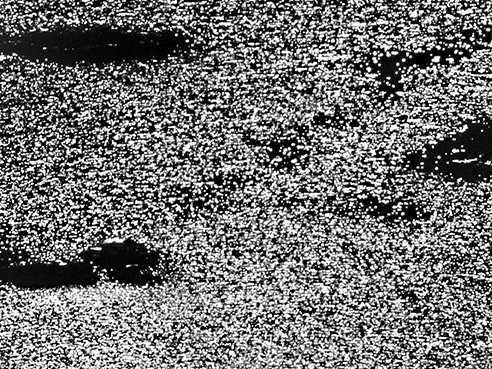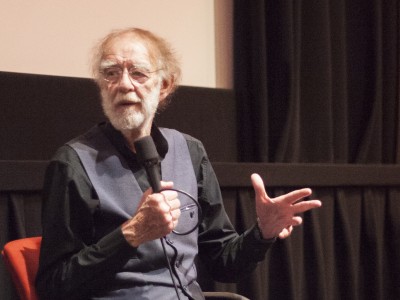
Peter Hutton Program 3 introduction by Fern Silva and Jeremy Rossen.
Transcript
John Quackenbush 0:00
November 13, 2016. The Harvard Film Archive screened works by Peter Hutton. This is the audio recording of the introduction by HFA junior curator Jeremy Rossen and filmmaker Fern Silva.
Jeremy Rossen 0:16
All right. Good afternoon, ladies and gentlemen. Jeremy Rossen, assistant curator here at the Harvard Film Archive. I'd like to welcome you back to our third and concluding program, where we honor the memory of filmmaker and Professor Peter Hutton, who passed away earlier this summer. So just to note, a few notes about tonight's screening before I introduce our special guest, Fern Silva, that all films tonight will be presented on glorious 16 millimeter. And they're all prints courtesy of Canyon Cinema.
So tonight, we're going to get back into, we'll start off with New York Portrait, Chapter II. For those of you who were here Thursday, we saw the first segment in what was a three-part series where, Hutton, his observational portrait of New York. This is from 1981. Then moving on, we move into 1997 and his first kind of exploration of the Hudson. We'll be showing Study of a River, from 1997. And then concluding the program will be Time and Tide. So this is, it was the second part to Study of a River. So we kind of see, it opens with Billy Bitzer's 1903 film, Down the Hudson. And then it moves into Peter Hutton's first foray into color photography and, and an extended exploration of the Hudson. So he kind of builds on Study of a River it's an amazing foray into color photography for Hutton, who, as many of you know, worked mostly in black and white. So here to say a few words tonight about Peter Hutton, we have Fern Silva. Fern is a filmmaker. Many of you may recognize him. He was a student here at UMass, with Saul Levine… at MassArt, sorry! MassArt. And he's currently teaching film production at Bard University, where Peter Hutton was the Director of Film Electronic Arts for many years. So with that, I'll invite Fern up to the podium. And just one quick reminder to make sure to silence all your cell phones during the screening when the lights go down. So, I’d like to call Fern Silva up to the podium. So thank you Fern.
[APPLAUSE]
Fern Silva 3:08
Hello. Thank you for coming. I want to thank the Harvard Film Archive for putting on the screening, and Jeremy Rossen for asking me to come out. I've spent countless hours in this room, watching films, and have been inspired over and over and over again, when I was an undergrad living in Boston. And so it's such an honor to be here right now, presenting these films. And hopefully, you guys will have that same feeling watching these films that I did when I was here coming to see all sorts of films. So I've been to, or a part of several of Peter's memorials over the past couple of months. And so, a lot of his former students, and he's been a mentor to a lot of these people that have spoken. And I've noticed that a lot of them end up talking a lot about themselves and how Peter helped them. And that's something I didn't want to do, and every time I started writing something, that's what it turned into. So I'm just going to talk about maybe a couple of moments that we've shared. And, but there's so many. So I, also I think I'm just gonna probably be a little scattered. Or just keep it kind of short.
So New York Portrait II, which is what, it's gonna be the first one that we're gonna see, arguably, well, I mean, myself, and several people often have this conversation, that it has one of the greatest shots ever documented on film, and it's up to you guys to figure out what shot that might be. But Peter's films, and often he would even admit to this degree of romanticism and beauty in his films, which are quite obvious. And what was amazing about Peter and his films is that he was so meditative, and determined to have these sort of static shots. And in this sense, it felt very precious, or it does, to a certain degree. But, you know, there, there have been several times where we've watched films together in his backyard, or at school, or when I was in graduate school, we'd be in my studio, and we would just watch films on maybe these fairly dinky projectors, and it would be his prints. And they would just sort of choke up sometimes and scratch the print. And then we'd all sort of gasp. And he'd just would think that that's part of the process, and he wouldn't care.
Fern Silva 5:18
So he was never really precious about the viewing experience. I'm just remembering this one time, we were in his backyard, and he was showing what I thought was a film of this footage that he shot in Berlin. And he was just like, no, this is just footage. And it was shot on Tri-X, which is, you know, positive stock or reversal stock. So it's camera original. It's the only film that exists. I'm not quite sure that anybody's ever seen that. Do you guys, have you guys seen that? It's not here, right, because it's, yeah. Yeah.
So anyway, and I was there also with an archivist, Andy Lampert, who's over at Anthology. And we're sitting there watching, and of course, we had some beers, and he was drinking mineral water. And the images were completely incredible. And I thought to myself, this isn't just a very important artistic document. It's also a very important historical document. And there were several times where the projector jammed, and the camera sort of started coming out of the other end, and was just flipping, and we're just like, oh, okay, well, that's okay, that's just a workprint. And he's like, no, it's Tri-X. It's just, it's the camera original. And yeah, I don't know, we just kind of freaked out about it. And he's like, you know, it's fine. It's like, we're here to watch this film. And I think that was certainly a moment that, you know, is very clear to think about. You know, that's just how Peter was, is that, you know, maybe he spent a lot of time shooting and being present. And, but at the same time, they were all just sort of based on moments. And so that certainly was one that was, won't ever be revisited. Because I don't know if that, those several frames even exist anymore. Or who knows where that film is now? So that's the first thing that came to mind. There was another moment where we were watching the film that he made in Iceland, and, and we were both sitting there for quite some time. And he was, you know, he was always a fan of hypnagogia, and just watching films, and sort of falling asleep and going into another world while you're watching this other made-up world. And I remember sitting there with him one time, and there was this one scene where there were like, several clouds and fog at different focal lengths. And, and there was a moment that, you know, this shot went on for a very long time. And I saw, I started to see an old man in the clouds. And I looked over to him and I was like, are you seeing the same thing? He's like, yeah! Yeah. And, and I was like, the old, and he was like, the gnome? And I was just oh, okay, no, we're not watching the same thing, you know? So it was just also another incredible moment that I shared with him. And you know, the list goes on. So I'll leave it at that. If you want to speak afterwards, we could talk, right? And I know that there's another screening at seven, so I guess I should stop there. But I hope you enjoy the program. And thank you.
8:12
[APPLAUSE]
© Harvard Film Archive




